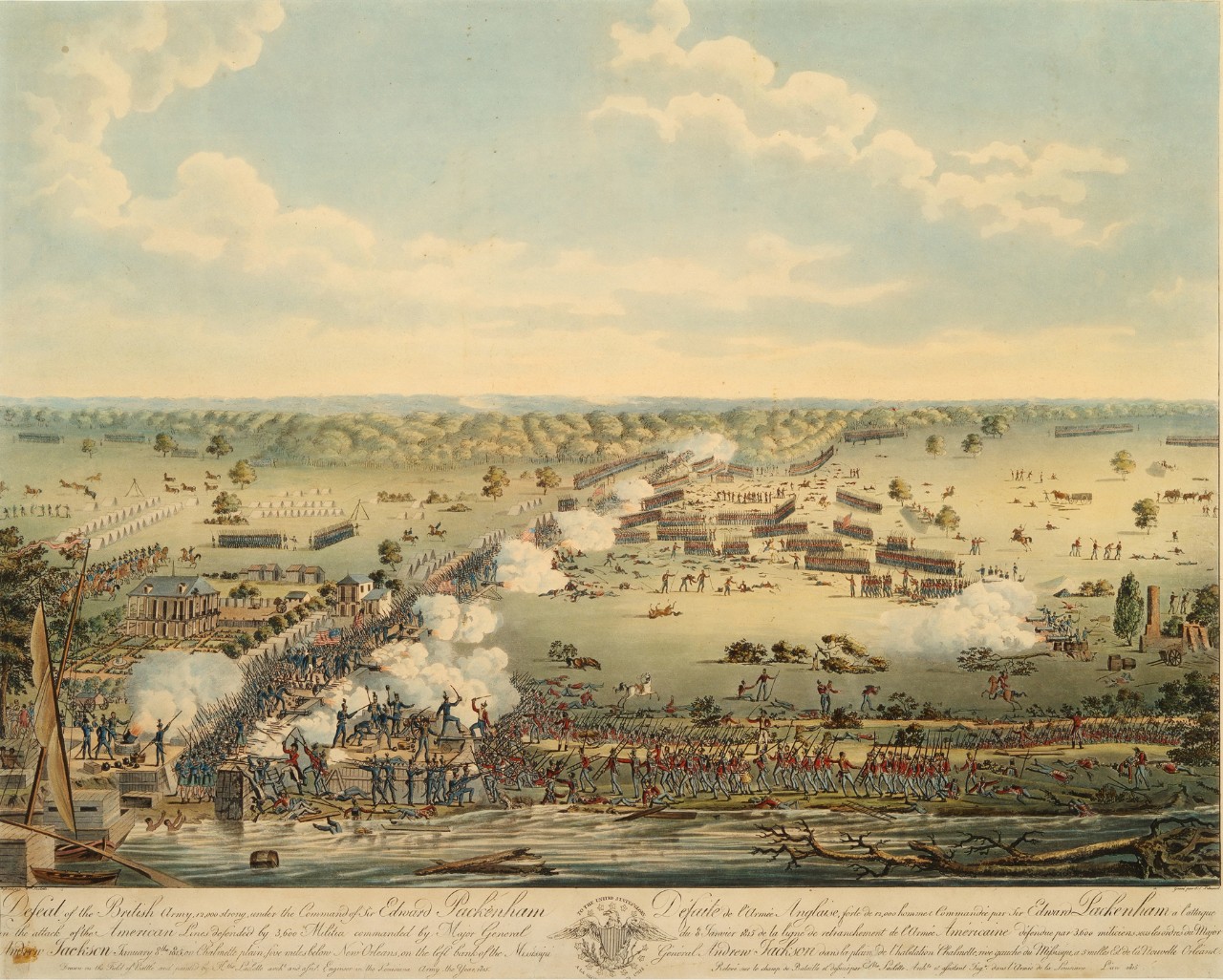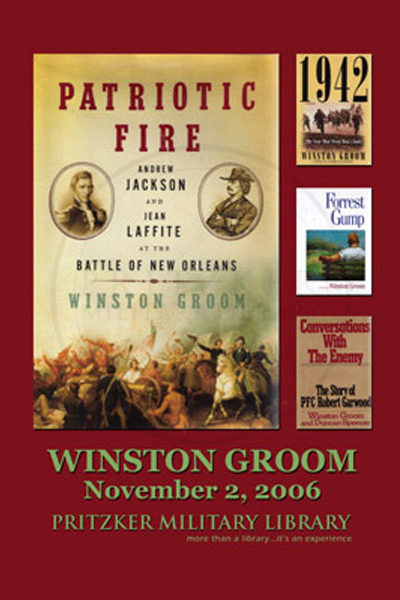The Battle of New Orleans
The War of 1812
The end of the American Revolution engendered many new disputes between its adversaries, United States, Great Britain and France. The escalating tensions with Britain culminated in the War of 1812 while Great Britain struggled against the French Emperor, Napoleon Bonaparte on the European continent.
Battle of New Orleans
In the summer of 1814, the British selected the primary western American seaport of New Orleans as a strategic objective to occupy it and West Florida in order to launch a lofty conquest north into the Louisiana Territory along the Mississippi River. This campaign culminated in the decisive, immortalized Battle of New Orleans (January 8, 1815). They believed victory in Louisiana would gain them stronger leverage during the diplomatic peace negotiations — which had recently begun in Ghent, Netherlands (now Belgium).
Brevet Major General Andrew Jackson led the American forces in the hastily organized defense of New Orleans. In mid-December, the Royal Navy disembarked many troops from Cat Island to Pea Island whom then marched overland to establish their camp and base in nearby Chalmette. Jackson concentrated his forces there as well, entrenched inside earthworks along the Rodriguez Canal. He directed them out to skirmish with the invaders sporadically, particularly at night. British naval forces mounted several missions to forge a breach along the American perimeter approaching the city, but defenders thwarted each.
The American force (while outnumbered) remained less exposed, and used their resources and terrain to their advantage. The force consisted of a mix of regulars from the American army, militiamen from Kentucky, Tennessee, and Mississippi, Navy sailors, Marines, Choctaw warriors, and pirates and smugglers under Jean Lafitte.
The main British army under Major General Edward Packenham — a distinguished veteran of the Napoleonic Wars — arrived on and after Christmas Day. On January 1st, the British artillery bombarded the Jackson’s position during which they incurred a similarly fierce return fire.
British commanders hoped for the American irregulars to falter under the pressure of their onslaught; however, low morale and disarray plagued their army. Nevertheless, they reluctantly prepared for the full-frontal offensive upon Jackson’s commanding salient along the canal. On January 7th, Gen. Packenham dispatched a small unit to overtake a U.S. battery located across the river parallel to Rodriguez Canal. The next morning, he led his army formed into tight columns on their complex, planned attack over open ground. The American defenders fired concentrated barrages of artillery and carefully timed infantry volleys at the oncoming redcoats. The British left received additional pummeling from the uncaptured battery across the river and armed barges. While on their opposite flank Choctaw sharpshooters inflicted a similar mayhem. Hundreds of British troops perished in the overwhelming fracas including Pakenham. Many casualties occurred when they vainly attempted to scale the American barricades on ladders they brought along. The battle ended in thirty minutes when the British withdrew yet they maintained their campaign to seize the city during the following weeks until notification of the treaty arrived.
Importance Today
Though the battle ensued following the signing of the Treaty of Ghent (December 24, 1814), the war remained officially in effect until both the U.S. and British governments mutually ratified it, which occurred the following month, February 1815. The victory significantly raised Andrew Jackson’s political profile. He went on to serve as the seventh president of the United States (1829 -1837). January 8th was commemorated as a significant date for half a century afterwards in the United States.
Want to Learn More?
Check out some other resources available from the Museum & Library to further explore this topic:
Pritzker Military Presents
Winston Groom - 1942: The Year That Tried Men's Souls and Patriotic Fire: Andrew Jackson and Jean Laffite at the Battle of New Orleans
 Winston Groom is the author of fourteen books, including Forrest Gump, Better Times Than These, the prizewinning Shrouds of Glory, and Conversations with the Enemy, which was a Pulitzer Prize finalist. He joins Ed Tracy for a one-on-one interview on his career and recent books including 1942: The Year That Tried Men's Souls and Patriotic Fire: Andrew Jackson and Jean Laffite at the Battle of New Orleans.
Winston Groom is the author of fourteen books, including Forrest Gump, Better Times Than These, the prizewinning Shrouds of Glory, and Conversations with the Enemy, which was a Pulitzer Prize finalist. He joins Ed Tracy for a one-on-one interview on his career and recent books including 1942: The Year That Tried Men's Souls and Patriotic Fire: Andrew Jackson and Jean Laffite at the Battle of New Orleans.
E-Books
Andrew Jackson and the Miracle of New Orleans, By Don Yaeger and Brian Kilmeade
The Battle of New Orleans, By Robert V. Remini
Print Books
Groom, Winston. Patriotic Fire: Andrew Jackson and Jean Laffite at the Battle of New Orleans. 1st ed. New York: Alfred A. Knopf, 2006.
Owsley, Frank Lawrence. Struggle for the Gulf Borderlands: The Creek War and the Battle of New Orleans, 1812-1815. Tuscaloosa: University of Alabama Press, 2000.
Remini, Robert V. The Battle of New Orleans. New York: Viking, 1999.